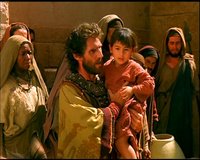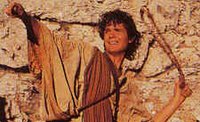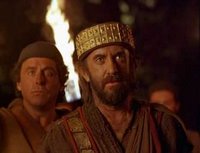 This is the second in a series of posts looking at the 1959 epic Solomon and Sheba. You can read them all here.
The last post
This is the second in a series of posts looking at the 1959 epic Solomon and Sheba. You can read them all here.
The last post in this series ended with me talking about the gulf in
Solomon and Sheba between the god that Israel believes itself to be following and the god that is depicted by the film itself, so I want to explore this now. I should start by pointing out that these observations are based on the portrayal in the film itself, rather than how things may or may not be in the Bible. The film takes a very limited amount of text and makes up a almost three hours' worth of story from it, so most of what we find is invention.
In his book on the film's director, King Vidor, Durgnat proposes that
As with others in the cycle [of biblical epics], the film's theology splices an Old Testament God (who speaks softly but carries a big lightning bolt and is open to a harsh bargain) onto a democratic God ("who teaches that all men are equal and none are slaves").6
Whilst Durgnat's analysis is correct as far as it goes, it does not quite get to the heart of the issue because the two 'gods' are not so much spliced together as in conflict. The god revealed through the
subjective beliefs of the Israelites and others in the film, is markedly different from the film's more
objective portrayals of God through his words and actions.
As noted last time, Israel is portrayed as a progressive nation. It believes in some form of democracy, the rule of law, that "all men are equal and none are slaves" and is strongly in favour of peace. And it believes these things are based on the "wisdom of God" and that Israel is sustained by "the grace of God", a god who is "called the all-knowing, the compassionate".
Of course these are
subjective beliefs, even including those of David who has received a "vision from God". In common with many biblical epics however the viewer is given more
objective evidence as to the character of God.
The first comes immediately following the "yearly feast of Rha-Gon" (orgy). Abishag recognises that Solomon has incurred the wrath of God goes to the temple to intercede for Solomon, ultimately offering that "if it be thy will to punish him, visit it upon me in his stead." This is immediately followed by lightning striking both the site of the Sheban celebration and the Hebrew temple, so fiercely that Abishag is killed by falling masonry. Sheba's adviser implies "it was nothing more than a coincidence", ("It was nothing more than a sudden storm. It is not the first time lightning has dealt death, nor will it be the last"), but the clear implication is that the storm is an act of God. Solomon's angry questioning "why did you not strike me?" summarises not just the audience's reaction, but also perhaps exposes Solomon's realisation that the God he follows does not tally with the benevolent deity he previously imagined he worshipped.
Shortly after the death of Abishag we are given a second, more objective and direct, insight into the real God of Israel, only this time by his spoken word, rather than his actions. The leaders of the twelve tribes come and confront Solomon about the dangerous path he is taking and reject him. The viewer is primed to side with their opinion and interpret Solomon's path and diverging from God's will. When they leave, Solomon is left alone to reflect and he mutters to himself assorted verses from the book of Ecclesiastes (10:6, 1:9, 6:12, 1:2; circa 99 mins). When the scene ends, the mood changes abruptly, as the calm of night is replaced with the harsh reality of day and a montage of images signifying God's judgement. There's a series of shots of parched ground, barren trees, tumbleweeds, broken buildings and vultures which pairs with a similar but opposite sequence earlier in the film celebrating Israel's prosperity under Solomon in the period before he met Sheba.
This time however the images are accompanied by the voice of God saying:
"But if ye turn away and forsake my statutes, then I will pluck them up by the roots out of my land which I have given them, and this house which is high shall be an astonishment to everyone that passeth by it..."
These words are taken from 2 Chron. 7:19-22 – the passage where God speaks to Solomon immediately after the dedication of the temple – and are intended as a warning rather than the confirmation of a judgement. Yet whilst these words are those of the God of the Bible, there are two significant differences between their use in Chronicles and how they function in this film.
Firstly, whilst the Solomon of the film's love for Sheba and involvement with her religion are not based directly on the Bible's account of their time together (1 Kings 10), it is consistent with the biblical Solomon's behaviour with other royal women at his court (1 Kings 11). Yet despite such a clear violation of God's warning the God of the Bible does not directly punish Solomon for his many marriages and dalliance with other gods, but delays his punishment until the rule of his son (1 Kings 11:12).
This variation alone would be harsh enough, but, of course, in the film propitiation has already been paid for Solomon's sin. Recognising the judgement that Solomon is bringing on himself, Abishag offers God a deal that he punish her and not him. When God takes the life of Abishag it is a tacit agreement to her terms. The deal that Abishag offered has been refused and both her, the one she loved and her entire nation have paid the price. Not only has Abishag paid with her life but Solomon will also be punished.
The final occasion when God is revealed more objectively occurs at the very end of the film when he speaks out loud to a now converted, repentant and reformed Sheba. On the eve of battle, and in the knowledge that she has played a pivotal role in his suspected downfall, Sheba heads to the temple to intercede for him and his army. There, suspecting that God still wishes to harm Solomon (despite Abishag's sacrifice and his subsequent additional punishment of the entire nation) she attempts to broker a new deal.
God of Israel, thou who art called the all-knowing, the compassionate, look into my heart and hear my prayer. Forgive my sin against thee and thy people. Grant me the life of Solomon and preserve him against his enemies. Do this, and I will return to the land of Sheba and cast down the false gods. And I will build a tabernacle to the glory of thy name, and there shall be no other gods before thee.
Immediately following this scene Solomon is inspired with an idea of how to defeat the Egyptians in the battle and the return of his troops who "rally" to them "by their hundreds", but the film is somewhat ambiguous as to whether this is God's action or mere coincidence. Even Solomon only says "It is
as though God had come to me and showed me the way" (emphasis mine) - a simile rather than directly attributing the source of his inspiration to God as his father did at the start of the film. The battle ensues with the Israelite troops reinvigorated. "Solomon's small force dooms the larger army by burnishing its shields until the sun's dazzle lures the charging cavalry into a canyon. The genre's de rigueur miracle thus comes down to human ingenuity and effort. Solomon's cleverly orchestrated idea remains...ambiguous."
7
Rather than being a revelation in itself, then, Solomon's ambiguous 'miracle' merely only paves the way for a more objective revelation. As the battle draws to a close, Sheba heads to the temple where she is intercepted by a large mob who begin to stone her. In the nick of time a triumphant Solomon arrives with the news of his victory. Several of those present, including Sheba, go into the temple. There Sheba kneels again before the altar – and the architecture of the temple is far more that of a church than that described in detail in the pages of Kings and Chronicles – where she hears God speak out loud his response to her.
Because thou didst call upon my name in thy dark hour, I have heard thee. Return therefore until thine own land and keep the covenant thou didst make with me.
In order to underline his acceptance of this agreement God also performs a miracle, healing Sheba's battered face whilst the Ark of the Covenant glows with his approval. Thus "the film ends with democratic Israel triumphing over absolutist Egypt, monotheism over paganism and duty over the desires of the flesh".
8 Whilst this is certainly the most benevolent of the three direct revelations it still suggests a certain amount of double dealing on God's part. Moreover it, in effect, portrays God as one who is suppressing female leadership of the Sheban hierarchy and replacing it with a patriarchal model.
The portrayal of gender in this film is significant enough to warrant a post in itself, but for now it's sufficient to note that not only is this film's God not challenging the male-dominated world of the time, he is actively trying to extend its influence. Again, this is a significant development of the Bible which suggest no such modification back in Sheba.
In these three examples we see the way the film portrays God as the dark malevolent force I mentioned in
the first post. The Israelites seem unaware of this - Israel has to stand in for the USA after all - but it creates a significant conflict at the heart of the film.
==================
6 - Durgnat, Raymond and Simmon, Scott. "King Vidor, American", (Berkley, University of California Press) 1988, p.311
7 - Durgnat, Raymond and Simmon, Scott. "King Vidor, American", (Berkley, University of California Press) 1988 p.314
8 - Richards, Jeffrey. "Hollywood Ancient Worlds" (London, Continuum: 2008), p.116Labels: Solomon, Solomon and Sheba









































